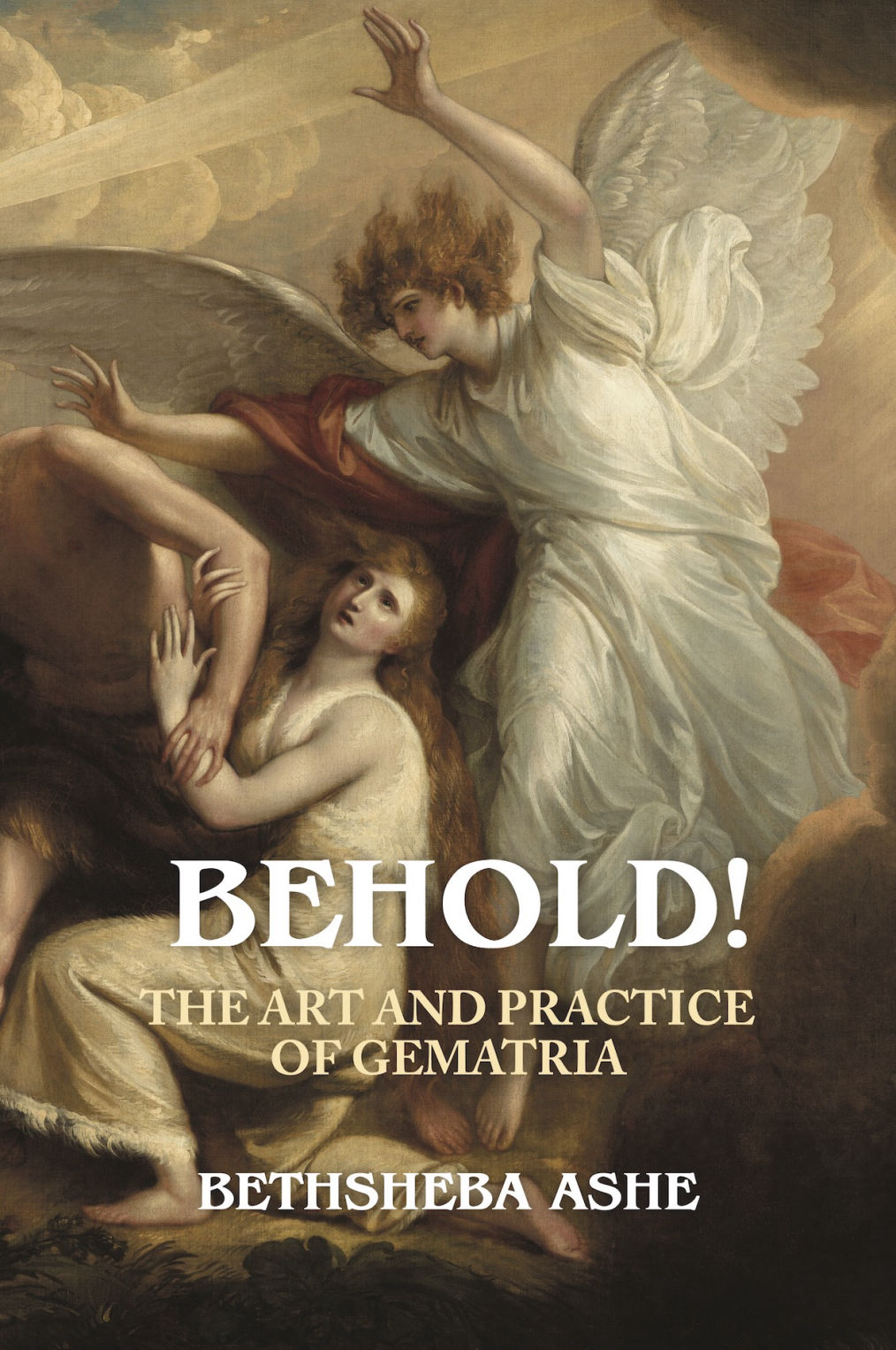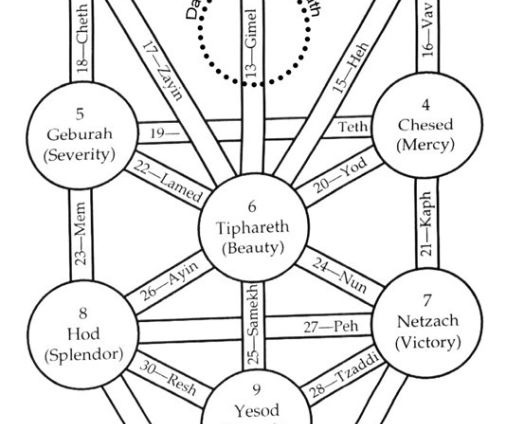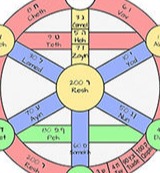Words and Calculations with the same Gematria value ...
| Word | Translation & Meaning | Transliteration | Strong's Number |
|---|
| אגן | Meaning: a bowl (as pounded out hollow). Usage: basin, cup, goblet. | AGN | 101 |
| אחמתא | Meaning: Achmetha (i. e. Ecbatana), the summer capital of Persia. Usage: Achmetha. | AChMThA | 307 |
| אנש | Meaning: to be frail, feeble, or (figuratively) melancholy. Usage: desperate(-ly wicked), incurable, sick, woeful. | ANSh | 605 |
| אנש | Meaning: a man. Usage: man, whosoever. | ANSh | 606 |
| אשכל | Meaning: Eshcol, the name of an Amorite, also of a valley in Palestine. Usage: Eshcol. | AShKL | 812 |
| דמות | Meaning: resemblance; concretely, model, shape; adverbially, like. Usage: fashion, like (-ness, as), manner, similitude. | DMVTh | 1823 |
| דמי | Meaning: quiet. Usage: cutting off, rest, silence. | DMI | 1824 |
| דן | Meaning: Dan, one of the sons of Jacob; also the tribe descended from him, and its territory; likewise a place in Palestine colonized by them. Usage: Daniel | DN | 1835 |
| דן | Meaning: this. Usage: (afore-) time, after this manner, here (-after), one. . . another, such, there(-fore), these, this (matter), thus, where(-fore), which. | DN | 1836 |
| זבדיאל | Meaning: gift of God; Zabdiel, the name of two Israelites. Usage: Zabdiel. | ZBDIAL | 2068 |
| חום | Meaning: sunburnt or swarthy (blackish). Usage: brown. | ChVM | 2345 |
| חמאה | Meaning: curdled milk or cheese. Usage: butter. | ChMAH | 2529 |
| טמה | Meaning: to be impure in a religious sense. Usage: be defiled, be reputed vile. | TMH | 2933 |
| יזואל | Meaning: Jezavel, an Israelite. Usage: Jeziel (from the margin). | IZVAL | 3149 |
| ילדות | Meaning: boyhood (or girlhood). Usage: childhood, youth. | ILDVTh | 3208 |
| יליד | Meaning: born. Usage: (home-) born, child, son. | ILID | 3211 |
| ישמא | Meaning: Jishma, an Israelite. Usage: Ishma. | IShMA | 3457 |
| כתל | Meaning: a wall (as gathering inmates). Usage: wall. | KThL | 3796 |
| כתל | Meaning: Usage: wall. | KThL | 3797 |
| לכד | Meaning: to catch (in a net, trap or pit); generally, to capture or occupy; also to choose (by lot); figuratively, to cohere. Usage: × at all, catch (self), be frozen, be holden, stick together, take. | LKD | 3920 |
| לכד | Meaning: something to capture with, i. e. a noose. Usage: being taken. | LKD | 3921 |
| לתך | Meaning: a measure for things dry. Usage: half homer. | LThK | 3963 |
| מבואה | Meaning: a haven. Usage: entry. | MBVAH | 3997 |
| מדבח | Meaning: a sacrificial altar. Usage: altar. | MDBCh | 4056 |
| מדי | Meaning: Madai, a country of central Asia. Usage: Madai, Medes, Media. | MDI | 4074 |
| מדי | Meaning: a Madian or native of Madai. Usage: Mede. | MDI | 4075 |
| מדי | Meaning: Usage: Mede(-s). | MDI | 4076 |
| מדי | Meaning: Usage: Median. | MDI | 4077 |
| מדי | Meaning: what (is) enough, i. e. sufficiently. Usage: sufficiently. | MDI | 4078 |
| מחבת | Meaning: a pan for baking in. Usage: pan. | MChBTh | 4227 |
| מטה | Meaning: a branch (as extending); figuratively, a tribe; also a rod, whether for chastising (figuratively, correction), ruling (a sceptre), throwing (a lance), or walking (a staff; figuratively, a support of life, e. g. bread). Usage: rod, staff, tribe. | MTH | 4294 |
| מטה | Meaning: downward, below or beneath; often adverbially with or without prefixes. Usage: beneath, down(-ward), less, very low, under(-neath). | MTH | 4295 |
| מטה | Meaning: a bed (as extended) for sleeping or eating; by analogy, a sofa, litter or bier. Usage: bed(-chamber), bier. | MTH | 4296 |
| מטה | Meaning: a stretching, i. e. distortion (figuratively, iniquity). Usage: perverseness. | MTH | 4297 |
| מטה | Meaning: expansion. Usage: stretching out. | MTH | 4298 |
| מישא | Meaning: Mesha, a place in Arabia; also an Israelite. Usage: Mesha. | MIShA | 4331 |
| מתי | Meaning: properly, extent (of time); but used only adverbially (especially with other particle prefixes), when (either relative or interrogative). Usage: long, when. | MThI | 4970 |
| נבב | Meaning: to pierce; to be hollow, or (figuratively) foolish. Usage: hollow, vain. | NBB | 5014 |
| נד | Meaning: a mound, i. e. wave. Usage: heap. | ND | 5067 |
| נשא | Meaning: to lift, in a great variety of applications, literal and figurative, absolute and relative. Usage: accept, advance, arise, (able to, (armor), suffer to) bear(-er, up), bring (forth), burn, carry (away), cast, contain, desire, ease, exact, exalt (self), extol, fetch, forgive, furnish, further, give, go on, help, high, hold up, honorable ( man), lade, lay, lift (self) up, lofty, marry, magnify, × needs, obtain, pardon, raise (up), receive, regard, respect, set (up), spare, stir up, swear, take (away, up), × utterly, wear, yield. | NShA | 5375 |
| נשא | Meaning: Usage: carry away, make insurrection, take. | NShA | 5376 |
| נשא | Meaning: to lead astray, i. e. (mentally) to delude, or (morally) to seduce. Usage: beguile, deceive, × greatly, × utterly. | NShA | 5377 |
| נשא | Meaning: to lend on interest; by implication, to dun for debt. Usage: × debt, exact, giver of usury. | NShA | 5378 |
| שאן | Meaning: to loll, i. e. be peaceful. Usage: be at ease, be quiet, rest. | ShAN | 7599 |
| שנא | Meaning: to hate (personally). Usage: enemy, foe, (be) hate(-ful, -r), odious, × utterly. | ShNA | 8130 |
| שנא | Meaning: Usage: hate. | ShNA | 8131 |
| שנא | Meaning: to alter. Usage: change. | ShNA | 8132 |
| שנא | Meaning: Usage: alter, change, (be) diverse. | ShNA | 8133 |
| תן | Meaning: a monster (as preternaturally formed), i. e. a sea-serpent (or other huge marine animal); also a jackal (or other hideous land animal). Usage: dragon, whale. | ThN | 8565 |





Please SHARE this PAGE!